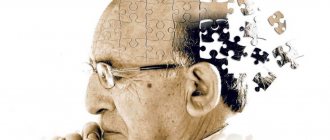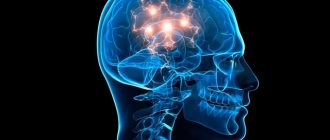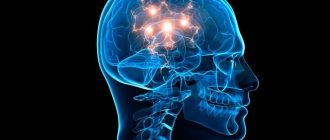When youth passes, people are left with a memory as a consolation, carefully preserving all the sorrows, joys, successes and achievements they have experienced. Alzheimer's disease and other types of dementia rob a person of more than memories - they literally rob him of everything that makes up life itself. To prevent the threat, we must try to do everything in our power.
Of course, forgetfulness with age is a natural thing. And not always, when memory weakens, you need to panic and suspect the worst. Indeed, according to statistics, for every person with Alzheimer's disease, there are 8 older people suffering from ordinary age-related decline in memory and intelligence.
The diagnosis is presumptive
It's not just Alzheimer's disease that can rob a person of memory and mental capabilities. “More than 30 other reasons can cause the development of dementia in old age. For example, vascular dementia is the cause of a third of such cases,” says Professor, Head of the Department of Geriatric Psychiatry, leading Russian specialist in the field of mental disorders of elderly and senile age, Doctor of Medical Sciences Svetlana Gavrilova. — Vascular dementia can occur both after major strokes and after repeated hypertensive crises and cerebrovascular accidents that were left without proper treatment. Weakened memory and decreased cognitive potential can also be caused by other causes: tumors, head injuries, intoxication, brain infections, metabolic disorders and even depression.”
In addition, as the expert said, doctors still do not have reliable non-invasive methods to accurately diagnose Alzheimer's disease. Therefore, during the patient’s lifetime, such a diagnosis is made on the basis of clinical symptoms and a whole range of studies, including by identifying biomarkers of Alzheimer’s disease in the cerebrospinal fluid.
Among hardware studies, CT and MRI of the brain are used, and neuropsychological testing allows for a detailed examination of intact and impaired cognitive functions. As part of a neuropsychological examination, the patient must remember a number of words, numbers, geometric figures, read, count, repeat a complex phrase, draw a clock with a given time, copy a geometric figure. However, these studies do not have absolute diagnostic significance.
Be in line. Will late retirement help prevent dementia? Read more
Life expectancy with vascular dementia
Vascular dementia is a severe form of the disease. Dementia is caused by vascular disease, often develops after an ischemic cerebral infarction or hemorrhagic stroke, with atherosclerosis or hypertension; factors in the development of this form of the disease can be heart defects, high lipid levels and other disorders. Vascular dementia affects men more often.
Adequate treatment can help prolong the patient's life, but the disease cannot be completely cured, since the processes taking place in the brain are irreversible. In the case of vascular dementia, it is impossible to give an accurate prognosis for life expectancy. Some patients live several months after diagnosis, while others live several years. Often patients die from concomitant diseases - heart attack, stroke.
In dementia accompanied by Parkinson's or Huntington's disease, the prognosis depends on adequate treatment of these diseases. Most often, dementia with such concomitant diseases is not characterized by rapid progression; the life expectancy prognosis is several years, with Huntington's disease - up to 10-15 years. Dementia with Lewy bodies is a rapidly progressive disease with a life expectancy of about 7 years.
Plague of the 21st century
More than a hundred years ago, the German psychiatrist Alois Alzheimer described a disease that people knew about before, although they did not consider it a pathology, believing that it was quite natural to not be friends with your head in old age. It turned out that dementia (dementia), which develops with Alzheimer's disease and other diseases, is not at all the norm. In addition, as it turned out, not only old people suffer from dementia.
The threat of memory loss and a decline in the mental potential of humanity could soon reach epidemic proportions. From 2010 to 2015 alone, statistics on dementia increased by 10 million cases. And scientists estimate that by the middle of this century there will be more than 130 million elderly people with dementia in the world. Moreover, if earlier this problem concerned mainly the population of high-income countries, today the frequency of the disease is growing like an avalanche in countries with middle and low incomes.
Life expectancy of bedridden patients with dementia
Bedridden patients with dementia are most often people who are at an advanced stage of the disease. Bedridden patients with dementia often die from pneumonia and sepsis, concomitant diseases already at a severe stage of dementia. The prognosis for dementia in bedridden patients is unfavorable, the condition is complicated by physical inactivity, impaired mental activity, and circulatory disorders. Patients in serious condition are completely dependent on outside care; dementia is complicated by other diseases due to the patient’s immobility. At the Yusupov Hospital, relatives of the patient are trained. Caring for bedridden patients is complex and requires patience and knowledge about the characteristics of the disease.
Not simple forgetfulness
“As a rule, the course of the disease from the moment obvious symptoms appear is quite rapid. Although the latent period, during which asymptomatic death of brain neurons occurs, can last a long time, for 20 years, warns Doctor of Medical Sciences Svetlana Gavrilova . “But it is at this very early stage that treatment is more effective. “Alas, after the manifestation of symptoms, the average life expectancy of patients is approximately 8-10 years.”
Dementia begins quite harmlessly, with banal forgetfulness, which is almost always perceived by others calmly and even with humor. Well, whatever you want, old age is not a joy. Further - more: patients experience depression, irritability, aggression. Personality changes are very characteristic: a person was kind, generous and intelligent, but suddenly became rude, suspicious, stingy, angry and stubborn. However, all this is also sometimes attributed to senile grumbling and bad character.
Article on the topic
Dentist instead of neurologist. How can dental care protect against dementia?
Rehabilitation in
The task of the staff of our rehabilitation center is not to treat the disease, since the processes occurring in the patient’s brain are irreversible. Our goal is to reduce the number, duration and severity of recurrent attacks, slow the progression of the disease and improve the quality of life of patients. The medical rehabilitation program includes:
- Drug therapy.
Depending on the type of disease, symptoms and degree of brain damage, the doctor may prescribe drugs that improve metabolism, normalize blood pressure, blood clotting, trigger the formation of new nerve cells, etc. - Occupational therapy and social adaptation.
Our specialists help patients regain or maintain the skills they need for life. - Diet.
All harmful foods should be excluded. The diet should be balanced. We do not use one nutrition program for all patients, but create it individually.
Many patients, especially older ones, do not tolerate a change of environment well, so their relatives tend to carry out rehabilitation at home. But at home, round-the-clock care for patients with dementia and comprehensive treatment are practically impossible. Nurses look after patients 24/7, and the rehabilitation program is drawn up and, if necessary, adjusted by competent doctors. A homely, cozy atmosphere allows us to reduce stress from a change of environment to a minimum: we have created all the conditions so that patients feel truly comfortable within our walls.
No criticism
The first suspicions arise when the patient develops speech disorders (for example, slowing down) and difficulties finding words, as well as problems with orientation in unfamiliar areas. But, as a rule, people go to the doctor (or more often their relatives bring them) only when forgetfulness appears too obvious. In particular, there are lapses in memory (especially regarding recent events and names) and disorientation in time and space. For example, a person cannot remember what was discussed just five minutes ago; he tells or asks the same thing. Or he may be puzzled by the question of what date and year it is. Such a person is capable of getting lost in his own yard or even in his apartment. By the way, an important point: at the same time, patients lack self-criticism. They do not notice any oddities in themselves, believing that everything is fine with them. And suggestions from relatives to go to a neurologist, and even more so to a psychiatrist, are perceived with resentment.
But if the progression of the disease is not slowed down with treatment, people quickly cease to recognize even those closest to them, understand speech, and then even forget about who they are, losing all skills and the ability to self-care. They begin to suffer from hallucinations, delusional ideas (most often they begin to suspect others of stealing or causing damage), constant anxiety and motor agitation arise. Then - only “vegetative” existence and death.
Stay sane. Can Alzheimer's disease be prevented? More details
Signs of dementia
- impairment of short-term memory. At the same time, events that happened many years ago may appear in small details;
- behavior change. The manifestation of individual character traits intensifies, suspicion, sloppiness, suggestibility, and apathy appear;
- confusion in an unfamiliar environment. At home, the patient remembers where he is, but on the street he may forget where he needs to go;
- confusion of thinking. The thread of the conversation is often lost; by the end of the sentence the patient does not remember what he said at the beginning;
- slowing down reactions.
What to watch out for
As Svetlana Gavrilova said, in addition to hereditary predisposition (in 10-15% of patients), the development of dementia can be facilitated by:
- low mental and physical activity;
- depression and chronic stress;
- head injuries;
- thyroid diseases;
- high cholesterol;
- arterial hypertension;
- diabetes;
- smoking, alcohol abuse;
- obesity, unhealthy diet;
- insomnia (sleep apnea).
By improving your lifestyle and starting to control all of the listed diseases, you can reduce the risk of senile dementia. There is an assumption that Alzheimer's disease develops more often and is more severe in people with a low level of education, since educated people have stronger connections between neurons in the brain, and if some brain cells die, their functions are taken up by other cells. Therefore, intellectual work, curiosity and daily learning of everything new is the best prevention of senile dementia. It is useful to learn foreign languages, memorize poetry and prose, comprehend new things, solve puzzles and crosswords, and understand computer programs. It is also necessary to develop fine motor skills - this also contributes to brain development and strengthening neural connections. Therefore, knitting, modeling, drawing and even just rewriting text by hand will be very useful.
Article on the topic
Dementia or forgetfulness? How to distinguish memory problems from illness
Life expectancy in early dementia
Life expectancy at an early stage of the disease largely depends on the age of the patient. The younger the patient, the more complex and faster the disease progresses. In older people, the disease does not develop as quickly. Detected dementia at an early stage allows you to remain in adequate condition for a long time and take care of yourself. Manifestations of dementia at an early stage are:
- forgetfulness,
- slight mood swings,
- slight decrease in intelligence.
Life expectancy of patients with dementia with optimal treatment
Life expectancy with dementia depends on the adequacy of treatment and care. At the first stage, the doctor prescribes diagnostic tests to differentiate dementia from other diseases. Treatment of senile dementia is based on eliminating the symptoms of the disease and reducing the risk of dementia progression. Dementia is an incurable disease, the course of which depends on many factors - age, gender, type of dementia, concomitant diseases, adequate treatment and care. A calm environment and lack of stress help reduce the risk of progression of senile dementia.
Doctors recommend a special diet, vitamin therapy, music therapy, aromatherapy, acupuncture and other methods that improve brain activity. The average life expectancy of a young patient with dementia can be about 7 years; older people with dementia live on average from 7 to 15 years. By contacting the Yusupov Hospital, you will receive medical care at the European level: they will carry out the necessary diagnostics, select the optimal therapy and rehabilitation program.
You can make an appointment with a neurologist by phone.
Questions and answers
What are the ways to prevent vascular dementia?
To prevent the formation of vascular dementia, it is useful to take vitamins and substances with antioxidant properties. These include vitamin E, C, and all types of polyunsaturated fatty acids. It is necessary to monitor sufficient levels of B12 and folic acid, and exclude foods high in cholesterol from the menu.
Can dementia be cured?
Vascular dementia cannot be completely cured. But with the right approach to therapy, it is possible to increase the patient’s life and activity.
What are the complications of dementia?
Complications are observed in severe stages of this disease and in the absence of complex therapy. A person completely loses social adaptation and ability to work, and injuries may occur due to ataxia. The main diseases that lead to brain pathology are getting worse - diabetes, hypertension, atherosclerosis.










